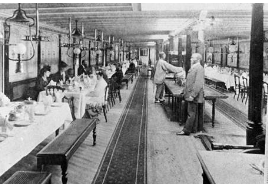Robert Wells was able to determine that there were only two steamships arriving in San Francisco from Hong Kong that month. One was a smaller but more modern steel hulled screw propelled steamship which only had room for 22 steerage passengers and the other the much larger all wooden paddle wheel propelled SS Japan. with room for 590 Chinese steerage passengers. Jue Joe had always told the family that he sailed from Hong Kong aboard an enormous ship with a large complement of Chinese passengers and that he served as a cabin boy on that ship . For these reasons Auntie Soo Yin and I believe that the SS Japan was the ship that Jue Joe arrived on .
It is fascinating that Robert Well's book is an in depth exploration of that very ship , the SS Japan, the largest paddlewheel steamer of it's time and a marvel of 19th century engineering . Unfortunately, later the very same year that Jue Joe arrived on that ship , the SS Japan was lost at sea off the coast of China in a late night coal fire with loss of life of 390 Chinese steerage passengers returning to China from America.
Here is a picture of the SS Japan .
Here is a picture of the berthing section for the Chinese Steerage passengers who were stacked three bunks high in the forward part of the ship .
Here is a picture of a Chinese cabin boy (steward) serving first class passengers in the dining salon . This is exactly the work that Jue Joe did. There were 30 Chinese cabin boys on the SS Japan. They wore black caps, all had black pig-tails that went down to their heels, dark blue tunics, large wide trousers, gaiters or white stockings, and black felt shoes with white soles. They served "22 guests in a large cabin , fluttering round them and serving them in the most respectful fashion, without making any noise".
Here is a talk that Robert Wells gave on the Pacific Mail Steamships, their role in Chinese Emigration to America, and the tragic loss of the SS Japan . I highly recommend his book which is available both as a Kindle e book and in print .





